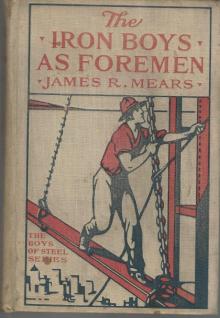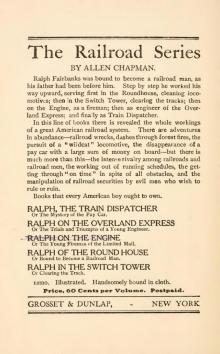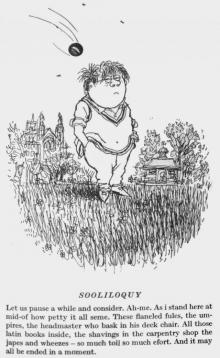- Home
- Mrs. Molesworth
The Third Miss St Quentin Page 13
The Third Miss St Quentin Read online
Page 13
mother?" she asked coldly.
"Of course," Madelene replied. "I said so." Colonel St Quentin movedimpatiently.
"Why can you not answer Ermine's question simply, Ella?" he said. "Andwhy do you speak to Madelene in that tone? It is, to say the least,very questionable taste to accentuate in that way the fact that you andyour sisters had not the same mother. And--if no one has told you sobefore, _I_ tell you now that your mother, my second wife, loved my twoelder daughters as if they had been her own, and her best wish for youwas that you might resemble them. Where you have got these vulgarnotions about half-sisters and so on--I see you are full of them--Ican't conceive. Is it from your Aunt Phillis?"
"No-o," Ella replied, a little startled apparently by her father'svehemence. "I did not intend to say anything to annoy you," she added.
"But about the singing?" Ermine said again.
"Yes," said Ella, "I do sing a little. I like it better than playing.I will try to sing if you--if papa wishes it."
Her tone was humble--almost too much so. There was a kind of obtrusivedutifulness about it that was rather irritating. Still Madelene gaveher credit for having put some force on herself to keep down her temper.
"Shall I play a little in the first place?" Miss St Quentin said,seating herself at the piano as she spoke.
Madelene played beautifully, though her style was very quiet. Ella rosegently from her seat and came nearer her; she stood silent andmotionless till the last soft notes had died away.
"That is lovely, most lovely," she said, her whole face and mannerchanging. "I should love the piano if I could play like that."
"You must love music, I suspect," Madelene replied. "Perhaps it is theactual mechanical part of playing that has discouraged you."
"I have bad hands for it," said Ella, looking at her very littlefingers, as she spoke.
"You have peculiarly small ones," said her sister; "that is like mamma.Still she managed to play very charmingly. Now what will you sing? Idare say we have some of your songs."
Ella opened a book of songs and ran through its contents.
"Yes," she said, "there are one or two of mine here. Perhaps," sheadded more timidly, "they are some that mamma sang, as Aunt Phillischose them. I will try this if you like," and she pointed to what hadbeen in fact one of Mrs St Quentin's special favourites.
It was a simple enough song, calling for no great execution, still,though the observation may sound absurd, it was a song depending for itsbeauty on the voice of the singer. And Ella's young voice suited itperfectly. There was complete silence till she ended. Then a slightsigh from her father made her glance at him.
"I remember that well," he said. "It is very sweet, very sweet. Thankyou, my dear."
"You have been very well taught it seems to me, Ella," said Madelene,"and you have a charming voice. It is a pleasure to accompany you.Still it would be well for you to accompany yourself sometimes--you mustkeep up your playing too."
"She must have lessons in both," said Colonel St Quentin decidedly.
Ella pouted.
"I hate playing," she repeated.
"Don't be childish," said her father sharply. "The question is not ofyour likes or dislikes. It is of what your capacities are. It seems tome you have taste for music and it is only common-sense in your--foreverybody to cultivate their best powers."
"I like singing," Ella said. "But I don't see that I need be _forced_to play if I don't want to go on with it. It isn't as if I were goingto be a governess."
"You would probably get to like it better after a while," said Ermine."No one could have had more difficulty with the mechanical part of itthan I, for though my hands are not small, my fingers are what is called`tight.' But I am so glad now that I didn't give it up, for though Ican't play like Maddie, I can join her in duets."
"Much more than that," said Madelene. "But, Ella, I am sure you aretired. Don't you think you had better go to bed? It is nearly ten. Ifeel rather tired myself, somehow."
Ella rose, with again her air of obtrusive submissiveness. The truthwas she was desperately tired--and longing to go to bed, but she wouldhave thought it beneath her dignity to allow it.
"I am not at all sleepy, thank you," she said, "but of course I am quiteready to go."
And she turned to bid her father good-night, with a little formal mannerthat would have been amusing had it not, under the circumstances, beenvery irritating.
"Good-night, papa. Come, Ermine, you are not to sit up any longereither. We are all rather tired," said Madelene with a littleintentional peremptoriness which Ermine understood, though Ella glancedat her with surprise.
"_I_ wouldn't be ordered about like that, at _her_ age," thought theyoungest sister.
Colonel St Quentin kissed his elder daughters in silence, but just asMadelene, who was the last to leave the room, got to the door, she heardhim sigh, and despite her resolution of not talking things over any morethat night, she could not resist turning back for a moment.
"What is it, papa?" she said gently.
"Oh, nothing much, my dear," he replied. "I am only afraid we are goingto have trouble with that child. I don't understand her. You andErmine never were like that--yet she is lovable too if she would allowherself to be so."
"Yes--I think so too, but, papa, don't think so much about her. Shewill fall into her place."
"She should never have been out of it. It is that I am blaming myselffor," he replied.
Madelene hurried up stairs after her sisters. They were just at thedoor of Ella's room--"the nursery"--when she overtook them. Ermineopened it--the candles were already lighted and Stevens was arrangingsome of Ella's belongings. It looked a pleasant and cosy room now, eventhe slightly faded air of the furniture rather added to its comfort. Noone, save a most perversely prejudiced person could have found anyreason to complain of such quarters. But a very perversely prejudicedperson Ella was, it is to be feared, fast becoming.
She sat down in the capacious, old-fashioned armchair, covered with thesame faded chintz as that of the window-curtains, and looked about her.
"Well," she ejaculated, "I wonder what Aunt Phillis would say, if shesaw me here. Here in the old _nursery_! After eleven years' exile frommy rightful home, this is the best they can give me."
Her glance fell on the toilet-glass--it was a large, handsome one, whichMadelene had directed the housemaids to put in place of the smaller onereally belonging to the room. The candles were lighted, two on themantelpiece not far from where Ella was sitting, and two on thedressing-table, and the girl's face and surroundings were clearlyreflected. She had loosened her hair and put on a little white jacket--and as she caught sight of herself, her face in the glass, looking evenpaler than in reality, her eyes sad and wistful, she wondered what herown reflection reminded her of. Suddenly she started--
"I know," she thought, "I know what it is. I look exactly like thatpicture of Cinderella in the _musee_ at Nantes that aunt and I went tosee last year. I didn't think I could ever look so pretty," and shesmiled with a little inward satisfaction. But the smile faded, and alook of perplexity replaced it. The sight of the old room, once sofamiliar, though since so entirely forgotten, was beginning to vaguelyawaken memories of her past childhood. And the association of thepretty French picture helped to bring one special scene to herrecollection.
"Yes," she said to herself, "I do remember--Harvey was sitting on thisvery chair, I do believe, with me on her knee, and there were picturebooks strewed about. And she told me the story of Cinderella, that wasit, and there is a confused remembrance in my mind of thinking I waslike her, the third sister, though at that time, of course, I knewnothing of half-sisters or stepmothers. Still, after all, I haven't astepmother--Madelene and Ermine had that, but they don't seem to havesuffered from it. I suppose my mother was a gentle, angelic sort of--goose--" Here Ella, to do her justice, felt a little shocked at herself."I shouldn't say that exactly. But she must have given in to them ineverything--ab
out sending me away after her death no doubt, for shecouldn't have _wished_ me to be expatriated Poor mamma. It would havebeen better for me, no doubt, if I had had more of her nature, but as Ihaven't--"
Then she sighed and glanced round the room again, while her mindreverted to her sisters' spacious quarters.
"It is very queer," she thought, "that I should have remembered aboutHarvey and the picture to-night. It was like a sort of vision of mylife and position--only--I fear there is no chance of the prince everfinding his way to me.

 The Iron Boys as Foremen; or, Heading the Diamond Drill Shift
The Iron Boys as Foremen; or, Heading the Diamond Drill Shift An Enchanted Garden: Fairy Stories
An Enchanted Garden: Fairy Stories Grandmother Dear: A Book for Boys and Girls
Grandmother Dear: A Book for Boys and Girls Ralph, the Train Dispatcher; Or, The Mystery of the Pay Car
Ralph, the Train Dispatcher; Or, The Mystery of the Pay Car The Children of the Castle
The Children of the Castle The Magic Nuts
The Magic Nuts Uncanny Tales
Uncanny Tales Silverthorns
Silverthorns The Third Miss St Quentin
The Third Miss St Quentin Christmas-Tree Land
Christmas-Tree Land Philippa
Philippa Jasper
Jasper The Little Old Portrait
The Little Old Portrait Mary: A Nursery Story for Very Little Children
Mary: A Nursery Story for Very Little Children Us, An Old Fashioned Story
Us, An Old Fashioned Story The Constant Prince
The Constant Prince Blanche: A Story for Girls
Blanche: A Story for Girls The Cuckoo Clock
The Cuckoo Clock The Carved Lions
The Carved Lions Tell Me a Story
Tell Me a Story That Girl in Black; and, Bronzie
That Girl in Black; and, Bronzie Sweet Content
Sweet Content Boys and I: A Child's Story for Children
Boys and I: A Child's Story for Children The Man with the Pan-Pipes, and Other Stories
The Man with the Pan-Pipes, and Other Stories Bert Wilson's Fadeaway Ball
Bert Wilson's Fadeaway Ball Nurse Heatherdale's Story
Nurse Heatherdale's Story Adventures of Herr Baby
Adventures of Herr Baby Shaggycoat: The Biography of a Beaver
Shaggycoat: The Biography of a Beaver Adventures of Prince Lazybones, and Other Stories
Adventures of Prince Lazybones, and Other Stories Adventures of Piang the Moro Jungle Boy
Adventures of Piang the Moro Jungle Boy